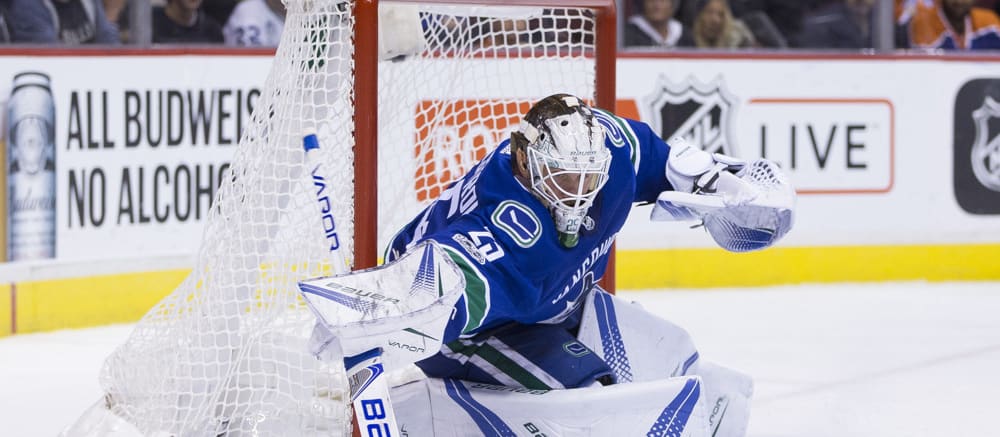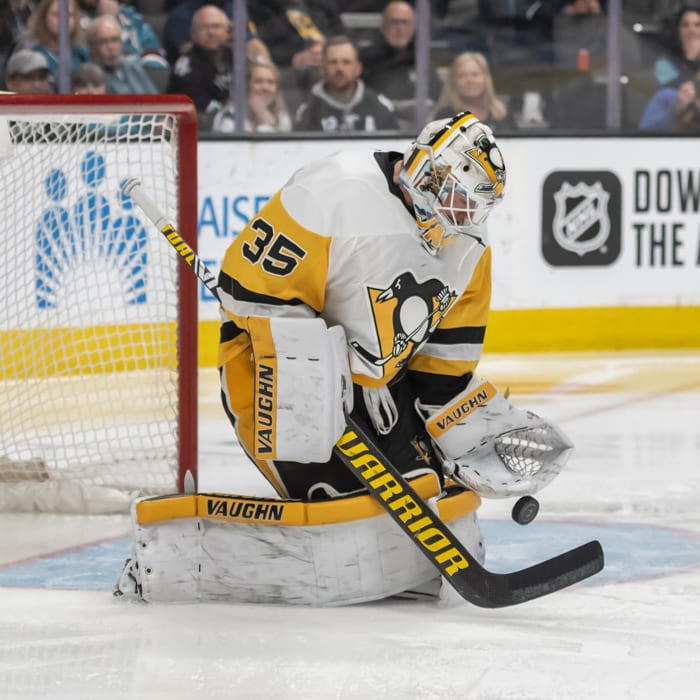This article is part of our Cap Compliance series.
While the current season remains on hiatus, there is no time like the present to start looking ahead to next year. Over the next several weeks, we'll take a look at the cap situation for all 31 NHL clubs, including restricted free agents, unrestricted free agents and even potential buyouts. Then, we'll play a little armchair General Manager by providing our recommendations for how we would approach the upcoming 2020-21 campaign if we were running the club.
In our most recent Twitter poll, the Pacific Division won out and will be featured this week before we close out the series with the Metropolitan.
2020-21 Cap Situation
The Canucks currently have 11 forwards, four defensemen and one goaltender under contract for next season at a price tag of $59,433,333 and will be on the hook for another $4,066,539 for Ryan Spooner's buyout and Roberto Luongo's recapture penalty. With a flat cap of $81.5 million, this leaves the club with $18,000,128 in cap space and seven spots under the 23-man roster to fill.
Restricted Free Agents
Jake Virtanen ($1.25 million) Tyler Motte ($975,000) Adam Gaudette ($916,667) Zack MacEwen ($847,500) Troy Stecher ($2.325 million)
AJ Scholz: Over the past three seasons, Virtanen has increased his production level leading up to this year's 36-point campaign. The 23-year-old winger should earn a contract similar to the four-year, $14 million contracts given to Bryan Rust and J.T. Compher the past two offseasons. The 25-year-old Motte is a bottom-six depth guy at best and missed a significant chunk of games this season. As such, he likely won't earn much more than a modest pay bump to $1 million AAV and for no longer than two years. After a disappointing rookie campaign, Gaudette rebounded with 12 goals and 21 helpers in 59 games this year and figures to earn closer to the $1.5 million range on a two-year bridge deal. With just 21 games of NHL experience, MacEwan shouldn't expect anything more than his qualifying offer. In terms of the blue line, Stecher has become a mainstay in the lineup, having played 65-plus games in each of his four NHL seasons and topping the 20-point mark twice. The 26-year-old defenseman figures to sign a contract similar to the five-year deal given to Marcus Pettersson in January of 2020, likely with a slightly higher AAV of $4.25 million.
Kyle Riley: Virtanen has improved steadily during the first five years of his career, but he has yet to live up to his first-round pedigree and hasn't cemented himself as a true top-sixer yet. I think a short-term deal would be best for the Canucks here. I think a two-year, $6 million deal should get it done. Motte is a dependable bottom-six option and also contributes as a penalty killer, so he's worth keeping around as long as he's willing to agree to a modest pay bump (two years, $3 million). Gaudette broke out to the tune of 12 goals and 33 points in 59 games this campaign, but he only notched 12 points in 56 contests as a rookie last, so I wouldn't be looking to hand him a long-term deal just yet. I think something like a two-year, $4.5 million deal should work for both sides. MacEwen has only appeared in 21 top-level contests through the first two years of his career, so he won't be getting anything more than his qualifying offer. Stecher's ice time fell off a cliff this year, as he only averaged 15:21 per game after logging 19:55 per contest last year. That's obviously a bit disconcerting, but the 26-year-old blueliner appeared to be on track to crack the 20-point mark for the third time in his first four seasons prior to the NHL's stoppage. If the Canucks decide to let Chris Tanev walk as an unrestricted free agent, re-signing Stecher will be a necessity. and I think he's worth around $3.75 million annually on a four-year deal.
Unrestricted Free Agents
Tyler Toffoli ($4.6 million) Josh Leivo ($1.5 million) Chris Tanev ($4.45 million) Oscar Fantenberg ($850,000) Jacob Markstrom ($3.7 million) Louis Domingue ($1.15 million)
AJ Scholz: The biggest priorities for the organization this offseason is going to be Toffoli and Markstrom, who figure to be the biggest UFA dominos to fall for Vancouver. It was a brief tryout with the organization but in 10 contests the 28-year-old averaged a point per game , including six goals. It was the second straight 20-plus goal season for Toffoli and that level of production shouldn't be allowed to walk. It might be a bit of an overpayment, however, the club could certainly afford a four-year, $5 million AAV deal to lock him in longer term. Leivo, meanwhile, is a capable forward but his season was shortened by injuries and there are players like Zack MacEwan or Justin Bailey looking for more opportunities who are more affordable. Similarly on the blue line, with the emergence of Quinn Hughes and Troy Stecher, there is little reason to pay Chris Tanev a large chunk of money, so letting him walk will keep the spending under control. It will, however, afford the club the opportunity to keep Fantenberg around essentially as an insurance policy if Brogan Rafferty or Guillaume Brisebois don't live up to expectations. This season's injury woes will almost certainly cost Markstrom some money, but he still managed to put up a respectable 23-16-4 record and 2.75 GAA in 43 appearances. With Thatcher Demko looking closer to NHL ready, the club won't want to commit to the 30-year-old Markstrom long term but a two-year, $8 million deal should see them get the netminder under contract until Demko is ready to take over. With both spots on the 23-man roster spoken for, there isn't any real reason to hold onto Domingue at this point.
Kyle Riley: The Canucks sent a pretty decent package to the Kings in exchange for Toffoli, so I don't see them letting him walk this offseason. I actually wouldn't be surprised to see him sign a shorter-term deal with the expectation he'll be able to cash in one more time in a few seasons when the cap has presumably risen. I could see a two-year, $10 million deal getting it done. Leivo was playing well prior to suffering a season-ending knee injury in December, having notched 19 points through the first 36 games of the campaign, but the injury will definitely cost him some cash. I'd try to get him re-signed on a one-year, $2 million "prove-it" deal. With the deal I outlined above for Stecher, Vancouver simply wouldn't be able to afford to bring Tanev back, so in that scenario he'd be playing elsewhere next year. Fantenberg is a decent bottom-pairing defender, but I think the Canucks should let him walk and use of their younger blueliners in that role next season. Markstrom is considered by most to have been the Canucks' MVP this season, and Demko appears to be at least a few years away from being ready to take over as Vancouver's No. 1 option, so bringing him back will be a top priority for GM Jim Benning. I think a four-year, $21 million deal would be worth every penny for the Canucks to keep the 30-year-old Swede in the fold while the team continues to grow towards being true contenders. With Markstrom and Demko positioned to be the team's one-two punch, there'd be no reason for Vancouver to re-sign Domingue.
Minor-League Free Agents *Who appeared in an NHL game in 2019-20
Nikolay Goldobin ($900,000) Tyler Graovac ($700,000) Justin Bailey ($700,000) Ashton Sautner ($675,000)
AJ Scholz: Goldobin has already signed a contract overseas next season, so he won't be back with the organization, though it will likely give him a qualifying offer that will retain his rights. With AHL Utica last season, Bailey racked up the second most goals (28) and should be a candidate for a spot on the Opening Night roster, yet he still shouldn't expect anything beyond his qualifying offer. If Sautner and Graovac are willing to return on two-way deals, then why not re-sign them, but it won't (shouldn't) be a priority for the Canucks this offseason.
Kyle Riley: As AJ mentioned, Goldobin will be playing in the KHL next year, so he'll just receive his QO so the Canucks can retain his rights for a potential return to North America in the future. Despite his success in the minors, Bailey has yet to do anything of note at the NHL level, so he won't get much (if anything) more than his QO. Graovac and Sautner are in the same boat, but they'll be UFAs this offseason, so if they're not willing to sign cheap, two-way deals, they'll be playing elsewhere next season.
Final Thoughts
AJ Scholz: Vancouver will need to get some money off the books and step one will be finding a trade partner to take Sven Baertschi in a deal. A buyout would be an option with just one year left on his contract, however, he just put up 46 points in 43 games with AHL Utica, which should give him some trade value. Step two is to figure out what to do with Loui Eriksson. The veteran struggled at times to even get into the lineup this year and he makes a ridiculous $6 million for a guy watching from the press box as a healthy scratch. Unfortunately, the way his contract is structured makes a buyout all but pointless. The Canucks would actually accrue more savings by placing him on waivers (hoping somebody bites) and then burying his contract in the minors.
Kyle Riley: The plan I outlined above would see the Canucks entering the 2020-21 campaign nearly $6 million over the cap, so they'll obviously need to get creative this offseason to make it work. Trading Eriksson would be an ideal scenario for the club, but they'll likely have to part with some major draft capital, a prospect and perhaps even another roster player as a sweetener to get it done.













